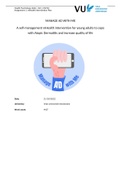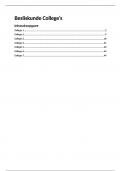Case uitwerking
Intervention plan Health Psychology | A self-management mHealth intervention
- Instelling
- Vrije Universiteit Amsterdam (VU)
Voor het vak Health Psychology hebben we een plan geschreven voor een mHealth interventie gericht op Atopic Dermatitis. Met behulp van de intervention mapping methode is dit uitgevoerd en beoordeeld met een 8,5.
[Meer zien]





